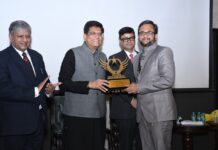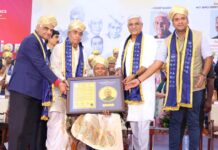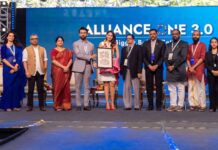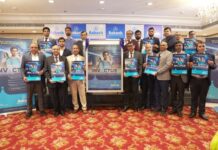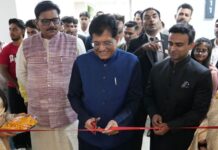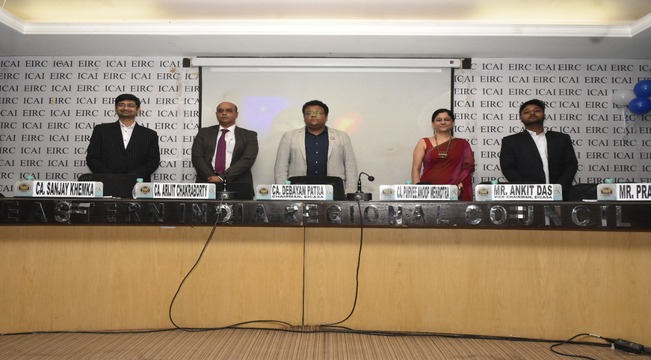Gurgaon, December 23, 2023: Great Lakes Institute of Management, Gurgaon hosted its 2nd International Winter Business School Conference (WBSC-2023) at its Gurgaon campus on 20th and 21st December 2023. The conference, with the theme “Managing Businesses for a Sustainable Future: G-20 and Beyond”, was led from the front by Convenors Dr Jagriti Arora (in the area of Finance) and Dr Vishal Dagar (in the area of Economics), and was a platform for academicians – both national and international, as well as industry practitioners and government representatives from India to explore innovative theories and applications of ‘sustainability’ in various domains of management practice. With this conference, which saw participation from nearly 100 delegates, GLIM has reinforced its standing as a leading academic and research institute in the sphere of “Sustainable business practices”, to offer to industry not only competent and environmentally responsible management professionals but also intellectual capital in all spheres of sustainability.
The pre-conference proceedings on 20th December included an address by leading British researcher, Prof. Richard SJ Tol of University of Sussex, and Editor-in-Chief, Energy Economics. Prof Tol is a Professor at the Department of Economics, University of Sussex and the Professor of the Economics of Climate Change, Institute for Environmental Studies and Department of Spatial Economics, Amsterdam, the Netherlands. Professor Tol talked about the intricate dynamics of climate change, dissecting transition risks and physical risks. In exploring vulnerability, he introduced a crucial perspective—that poorer countries are more susceptible to climate change and cited reasons such as economic structure, temperature, and governmental capacity. He challenged the deterministic notion that links poverty directly to higher temperatures, providing a nuanced view of adaptation challenges faced by hotter regions. He made an interesting observation-for India, citing that an appropriate carbon tax of $95 per tonne of CO2 might be sufficient to come closer to India’s climate targets and can replace all existing taxes.
This was followed by a panel discussion by industry representatives on their various sustainability initiatives. The industry panel included Shri Adika Ratna Shekhar, Chairman and Managing Director of Balmer Lawrie; Ms Bandana Jha, Executive Director, Philanthropy & Community Impact, Mr Karthik Sathyanarayana, Global Commercial Leader, Schneider Electric, and Ms Tania Banerjee, Project Leader, Climate & Sustainability, Boston Consulting Group. The industry panel was moderated by Dr Sanghamitra Bhattacharyya, Professor of Organisational Behavior, and Director of the Centre of Excellence for Sustainable Development, at GLIM Gurgaon. The panel collectively took stock of the worrying global and national trend of realization of SDG targets, and suggested a triangulated approach of industry-academia-public sector partnership to take forward the collective journey of sustainability for India.
On 21st December, a panel of think tanks and policy makers deliberated on performance of G-20 countries on selected Sustainable Development Goals (SDGs). The panel saw representation from senior personnel: Ms Mikkiko Tanaka, Director, South and Southwest Asia Sub-regional Office for UN Economic and Social Commission for Asia and the Pacific, Mr Tapas Paul, Lead Environmental Specialist at World Bank, and Mr Bipul Chattopadhyay, Executive Director at CUTS (Consumer Unity and Trust Society). The session was moderated by Prof Bappaditya Mukhopadhyay, Professor of Analytics & Finance, at GLIM Gurgaon. The panel, responding to the moderator’s initial context of India’s worrying performance on certain SDG targets (e.g. SDG 2, SDG 5, SDG 10, etc), did agree that the intent was clearly there, and given the moving targets of the SDGs, there were positive signs of development. The panel also identified areas where Indian organisations such as Reliance, Tata group etc. are making significant quantum of investments in clean energy and concluded with the understanding that sustainable development – which is a balance between equity, economics and environment – needs a combined approach by the government, society and market.
The conference was formally inaugurated by Ms Samyukta Samadar, IAS, Commissioner, National Capital Region, and GOI Nodal for SDG. Ms Samaddar, in her address reinforced the scenario which showed that only 15% of SDGs are on track, one third are moderately on track and 37% targets are in fact regressing. With respect to India, she highlighted that there are areas of concern with respect to SDGs 2, 5, 10 etc. Given that India’s progress (or lack of it) on SDGs can make or break the global progress on SDG, she highlighted 6 key transitions that would be crucial to ensure progress: (1) Food systems, (2) Energy access and affordability, (3) Digital connectivity, (4) Education, (5) Jobs and social protection, and (6) climate change, biodiversity loss and pollution.
Dr Brandon Randolph-Seng, Professor of Management at Texas University A&M- Commerce delivered a thought-provoking key note address titled “Is Sustainability Sustainable”, where he posed crucial questions such as how to balance the needs of the present without compromising the ability of future generations to meet those needs, and whether current consumption patterns & lifestyles are going outlive the finite resources available. Some challenges that were discussed with the audience included issues on the dichotomy between short-term and long-term goals, supply chain disruptions, lack of standardized sustainability labeling and certification, financial challenges, and emerging geopolitical and societal tensions.
The conference saw more than 20 paper presentations by researchers and academics from across the country on various themes of sustainability with respect to management functions such as Finance, Marketing, Operations, and Human Resource Management. The three best paper awards were given to Ms Amrita Pani (BITS Pilani, Hyderabad) for her paper on “An insight into the emissions: A case study of decades of emissions in India”, Mr Akshaya Kr Mishra (Jaipuria Institute of Management) for his paper titled “Role of financial planning well being: The mediating role of perceived risk”, and Ms Shriya Sharma (University of Jammu) for her paper on “Analysing the framework of turnover intentions & work behavior: Role of ambidextrous learning and psychological capital”
A highlight of the day was a fireside chat with journal Editors, with eminent researchers including Dr Brandon Randolph-Seng, Prof. Leila Dagher (Lebanese American University (LAU), Lebanon), and Prof. Aviral Tiwari (IIM Bodh Gaya) advising researchers and students on how to publish quality research work in peer reviewed academic journals.
GLIM Gurgaon, despite being among the youngest business schools in the country, has been going from strength to strength, in terms of NIRF rankings, AMBA, AIU and AICTE accreditations, upcoming AACSB accreditation, impressive quantum of research publications by its faculty members in internationally and nationally reputed journals, and rapid increase in number of programs offered for different categories of students and different market needs (https://www.greatlakes.edu.in/gurgaon/).
Corporate Comm India (CCI Newswire)







